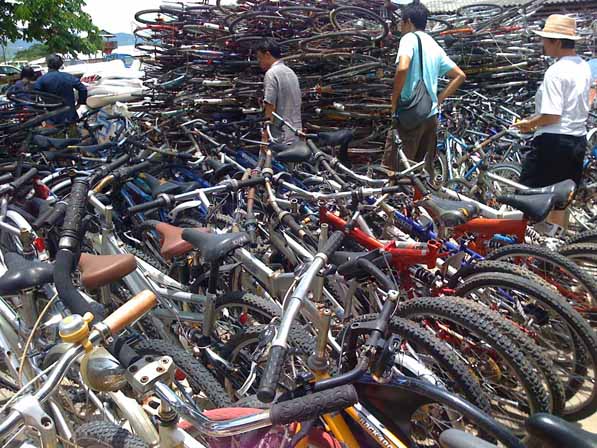Boom or Bust?

The Burmese junta is moving ahead with the Myawaddy special economic zone, which may or may not benefit the DKBA
The Burmese military regime has long talked about, but never implemented, a special economic zone (SEZ) near the Burma-Thailand border. But the junta’s cabinet recently approved the official creation of the SEZ, along with a plan to increase investment in the project.
This could result in a business boom for Col. Chit Thu and his Democratic Karen Buddhist Army (DKBA) cronies who control the area surrounding the SEZ and have already established their own commercial empire on the border. But if the project is too successful, it could turn into a bust for Chit Thu, because the junta might want to keep control in the hands of its own generals.
.jpg) |
| DKBA Battalion 999 Headquarters on Burmese slide of the Moei River.(Photo: YENI / THE IRRAWADDY) |
In theory, the SEZ should benefit the DKBA. Following the defeat of the Karen National Liberation Army’s (KNLA) Brigade 7 last June, the DKBA secured control of a long stretch of the Burma-Thailand border extending in both directions from the SEZ. Chit Thu has built a business conglomerate in the area that includes trade in timber, metals and automobiles, and for the last few years the junta has let him operate as he sees fit.
According to an Indian timber trader based in Singapore, the SEZ will indeed benefit the DKBA. The businessman told The Irrawaddy that although the lack of infrastructure on the Burma-Thailand border has always been a deterrent against his company doing business, “Now things are getting better—Thailand is building more roads, so it [the border] has become a much more attractive place for us.” And with more businesses like his setting up shop on the border to gain trading access to the resources of Karen State, the DKBA will become an even bigger player, he said.
But other sources believe that future border trade will be controlled directly by the Myanmar Federation of Chambers of Commerce and Industry, functioning together with the Department of Border Trade, which combines units from Burma’s army, police, customs and immigration authorities.
Given these whisperings, some DKBA members are understandably nervous about whether the junta will grant them business dominion over the area. “The [DKBA] leaders have discussed the [SEZ] before,” said a DKBA official. “They know it could mean big business, but we’re not sure how much the government will control it.”
David Takapaw, the deputy chairman of the Karen National Union (KNU), the KNLA’s parent political organization, told The Irrawaddy that he believed the DKBA would not benefit from the economic zone at all.
“This project is for the Burmese government, they won’t let the DKBA have any control,” he said. “Only a few top leaders will benefit who are directly paid by Burma’s military government.”
Not only could the DKBA be cut out of the SEZ bonanza, if it ever materializes, it may lose some of its lucrative black market trade as well. There is a maze of smuggling routes which see massive amounts of goods going across the Moei River every day, ranging from Japanese cars to Burmese fabrics. Much of the illegal border trade is run by the DKBA, which operates the majority of the gates where “traders” have to pay tax to move their products into and out of Burma. One of the aims of the SEZ, however, is to reduce illegal smuggling over the border and create an official channel for the trading of raw materials and other goods.
Some DKBA officers are reportedly concerned about the effect that regulated trade would have on their small enterprises. “Some of the gate commanders see it [the SEZ] as a threat, but for the big leaders it could be a gold mine,” said the DKBA source.
In the future, if only selected members of the DKBA are allowed to reap the rewards of the SEZ and border trade, the DKBA may find itself with a divisive issue splintering its ranks. Given that a large faction of the DKBA led by Col.
1 | 2 next page »
